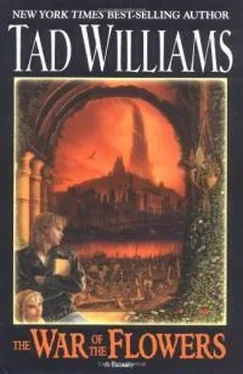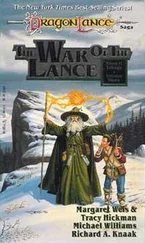Тэд Уильямс - The War of the Flowers
Здесь есть возможность читать онлайн «Тэд Уильямс - The War of the Flowers» весь текст электронной книги совершенно бесплатно (целиком полную версию без сокращений). В некоторых случаях можно слушать аудио, скачать через торрент в формате fb2 и присутствует краткое содержание. Год выпуска: 2003, ISBN: 2003, Издательство: DAW Books, Жанр: Фантастика и фэнтези, на английском языке. Описание произведения, (предисловие) а так же отзывы посетителей доступны на портале библиотеки ЛибКат.
- Название:The War of the Flowers
- Автор:
- Издательство:DAW Books
- Жанр:
- Год:2003
- ISBN:0-7420-9316-6
- Рейтинг книги:3 / 5. Голосов: 1
-
Избранное:Добавить в избранное
- Отзывы:
-
Ваша оценка:
- 60
- 1
- 2
- 3
- 4
- 5
The War of the Flowers: краткое содержание, описание и аннотация
Предлагаем к чтению аннотацию, описание, краткое содержание или предисловие (зависит от того, что написал сам автор книги «The War of the Flowers»). Если вы не нашли необходимую информацию о книге — напишите в комментариях, мы постараемся отыскать её.
The War of the Flowers — читать онлайн бесплатно полную книгу (весь текст) целиком
Ниже представлен текст книги, разбитый по страницам. Система сохранения места последней прочитанной страницы, позволяет с удобством читать онлайн бесплатно книгу «The War of the Flowers», без необходимости каждый раз заново искать на чём Вы остановились. Поставьте закладку, и сможете в любой момент перейти на страницу, на которой закончили чтение.
Интервал:
Закладка:
"You're singing," Khasigian said as Theo hung the keys on the hook board. "Is that a good thing?"
"Guess that's for the people listening to decide."
Khasigian squinted at him, gnawed his pencil. He had a shiny bald head like an ancient tortoise, but the rest of him was surprisingly fit for his sixty-something years. He jogged, sometimes coming into the shop on hot days in running shorts and allowing the employees to make respectful jokes about his thin brown legs. "It could be worse. You sing okay. But I don't like it when my employees are happy. I think when they are not afraid they don't work so hard."
"A priceless example of your nineteenth-century management style." Theo plucked his faithful leather jacket off the rack. "That's why you win the Ebenezer Scrooge Award year after year, Mr. K. They're going to have to retire that trophy, you know."
"Go home, Singing Boy. Go annoy someone with less to do."
Khasigian could be an unalloyed bastard occasionally, and he certainly wasn't going to drown his employees in money and benefits, but he was at least middling honest and did a pretty good imitation of the Gruff But Lovable Boss when he wanted to. Too good, really — that's how you could tell it was only an act.
Theo rode back to the Sunset district with the visor of his helmet open. The wind was damp and warm and the smell of blossoming things filled the air, stronger even than the auto exhaust.
Mrs. Kraley was out in the yard next door, watering her garden. Theo waved to her. She did not wave back, although she was only using one hand to operate the hose. Mrs. Kraley was another thing that made staying at his mother's such a warm, satisfying experience.
His mother did not respond to his call when he came in. After the terrible night when he had found Cat, he had a reflexive need to know where everyone was, so he checked and found her in her bedroom, napping fully dressed, propped on three pillows, her chest moving up and down just like it was supposed to. It was strange to see her sleeping in the middle of the day, but then again he seldom came home right after work ended.
He wandered back to the kitchen, took a bottle of beer out of the refrigerator, then made his way out to the tidy emptiness of the living room. He found himself wishing that if he had to be stuck in his parents' house, it was at least the house in San Mateo in which he had grown up, a place with memories, where he would have something to react to, even if only depressive nostalgia. But his mother and father had bought this house less than ten years ago, a year after Theo had moved out for good and his father had retired — a retirement Peter Vilmos had only a few years to appreciate before the massive stroke had killed him. His picture stood by itself on the mantel, a setting too stark to be any kind of a shrine. There were moments when Theo thought he saw his own features in his father's, when the jaw or cheekbones seemed inarguably his own, but most of the time the man seemed as remote genetically as he had been paternally, a decent guy who had simply worked too many hours to have much strength left for dad-stuff.
There were no other pictures of Pete Vilmos anywhere on display, which had more to do with Theo's mother than any fault of his father. She had only one of Theo as well, a school picture from when he was in second or third grade that sat on her dresser, still in its original little cardboard frame. There were no other photographs visible in the house, and very few pictures of any kind. The large framed print of a bridge over the River Liffey in Dublin on the living room wall was the exception, and Theo believed it was mostly there because the wall would look too bare without it. Anna Dowd Vilmos was not sentimental.
In an uncharacteristic bit of disorganization, his mother had left her coat over one of the chairs and her purse lying on its side on the dining room table; a small scatter of objects had fallen out of the open top. He found himself wondering what exactly it was she did all day. She volunteered at the library, but that was only once a week. Most of her working years had been spent cooking and cleaning for her child and her fairly old-fashioned husband. What did she do with her time? A pang of guilt struck him, that he was only thinking about this now, with his own life in tatters. Dad had been dead for a long stretch. Had Theo, her only child, ever gone to her and asked her if there was something he could do to help? Had he tried to make time for her, take her out, get to know her? Sure, she wasn't the most responsive person in the world, but he hadn't done much to try to overcome that, had he?
He left the silent television, the muted scenes of car accidents and school district protests on the early evening news, and hung his mother's coat up in the closet. He could make her dinner. That would be something nice to wake up to, wouldn't it? He wasn't a great cook, but he wasn't hopeless, and even grilled cheese sandwiches and canned tomato soup would be better than her having to get up and do the cooking. Or maybe he should just take her out to a proper dinner. Call John from a restaurant, then they could all go out and see that Irish band.
He was halfway through scooping the fallen objects back into her purse when he realized he was holding a pill bottle, that he had been looking at it for some moments without quite understanding why he had paused.
Fentanyl Citrate , the label read. It also had a bright orange warning label.
It took long seconds reading through the many cautionary notations on the label before he understood that what he was looking at was some kind of morphine derivative — serious, serious pain medication. His insides went cold, as though he himself were being numbed. He stared at it a moment longer, then, not entirely conscious of what he was doing or why, dumped his mother's purse out onto the table. A lipstick rolled off and clicked onto the floor but he did not bend to pick it up. The glossy pamphlet, folded and unfolded so many times that the creases were white, had a bar across the top that identified it as a publication of the California Pacific Medical Center. The words on the cover, the typeface careful, almost respectful, read " Pancreatic Cancer: Questions and Answers ."
"Why didn't you tell me?"
She gave him a look that was like something he'd expect from Kris Rolle, almost teenage in its sullenness. "I didn't know for sure. They're still not one hundred percent certain until they do a biopsy, but the what-do-you-call-it, the endoscope, showed there was a big tumor." She shrugged. "It wasn't nice, that endoscope. I didn't want to go in for it — I hoped it was nothing."
"This is bad, Mom. We have to get serious about this. This is important!"
For a moment her expression seemed to lighten, but there was an abyss behind her crooked smile. "Yes, Theo. I know."
"Sorry. Jesus. Sorry." He took a deep, shuddering breath. "What did they tell you?"
What they had told her was not good. If the biopsy confirmed it was malignant, as seemed very likely, it was probably Stage Three or Four, she said. He found out the next day, when he used the computer at the library to go online, that they were usually spelled "Stage III" and "Stage IV," as though putting the ugliness in Roman numerals made it distant, somehow, less fearful, a mere historical footnote. It seemed to have gone undetected for a long time already, the doctor had told her, which was often the way with pancreatic cancer since it was seldom noticed until the tumor began to press on the other organs, and the chances were high that it had spread into her lymphatic system, rogue cells sowing the seeds of chaos throughout her body.
"Six months," she said. "A year if the radiation and chemotherapy help."
"Jesus." He stood staring at her awful composure. "Are you telling me it's incurable?"
Читать дальшеИнтервал:
Закладка:
Похожие книги на «The War of the Flowers»
Представляем Вашему вниманию похожие книги на «The War of the Flowers» списком для выбора. Мы отобрали схожую по названию и смыслу литературу в надежде предоставить читателям больше вариантов отыскать новые, интересные, ещё непрочитанные произведения.
Обсуждение, отзывы о книге «The War of the Flowers» и просто собственные мнения читателей. Оставьте ваши комментарии, напишите, что Вы думаете о произведении, его смысле или главных героях. Укажите что конкретно понравилось, а что нет, и почему Вы так считаете.

![Герберт Уэллс - The War of the Worlds [С англо-русским словарем]](/books/26611/gerbert-uells-the-war-of-the-worlds-s-anglo-thumb.webp)









